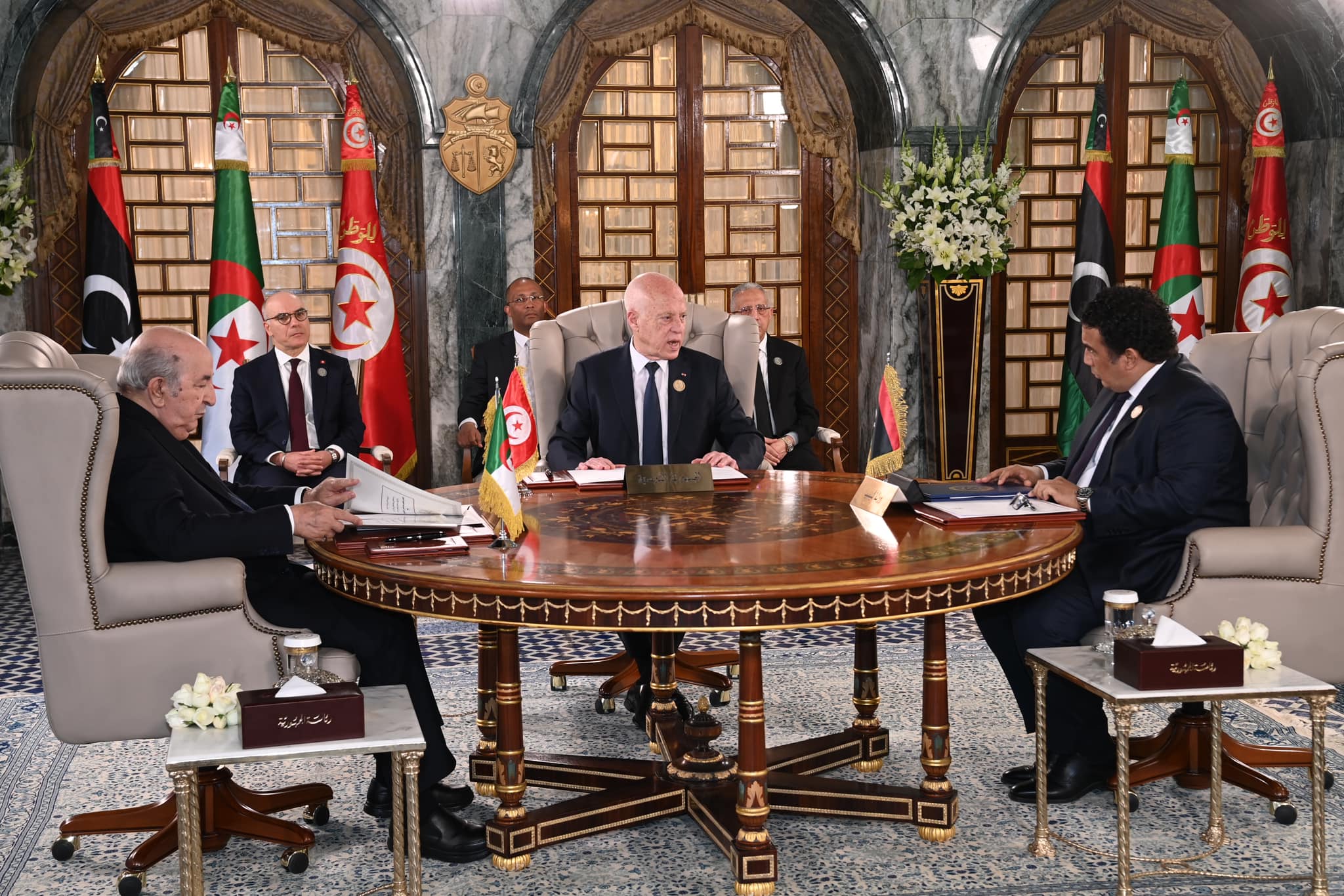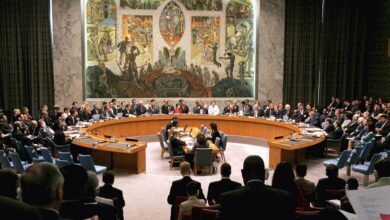The birth of the Group of 3 in Carthage.. The Arab Maghreb for work instead of the Arab Maghreb Slogans – Algerian Dialogue

The founding decade of the Algerian-Tunisian-Libyan tripartite initiative established pragmatic diplomacy, as the emergence of this new regional bloc constituted evidence that movement in politics, as in life, is always better than stagnation.
Observers disagreed about naming the summit that brought together the three Algerian, Tunisian, and Libyan presidents between the “Carthage Agreement,” the “Arab Maghreb Union bis,” and the “Tunisia Trio.” Skeptics also had expectations about the results of this trilogy, predicting that it would never take place.
However, on April 22, a founding meeting for a new approach was held. Next year, 2025, it will be exactly 30 years since the announcement of the clinical death certificate for the Arab Maghreb Union, which no longer exists in reality.
The Moroccan Minister of Foreign Affairs, Filali, had announced at the time the freezing of the Arab Maghreb Union, and since then all of the Union’s institutions have been suspended except for the General Secretariat of this “Union,” which was placed under the supervision of the warehouse that he was renting and using when necessary to legitimize his work through alleged approval of this. Maghreb Union.
To remind those with weak memories, in 1995, the Moroccan Minister of Foreign Affairs, Filali, wrote to his counterparts in the Arab Maghreb Union to inform them of the freeze of this union. Since that time, under the pretext of the Western Sahara problem, the Arab Maghreb Union has ceased to exist.
If the Secretary-General of the Arab Maghreb Union had been retained, the latter was well taken care of by the Royal Palace, where he was transformed into a “subservient Moroccan diplomat” instead of the Secretary-General of the Maghreb Union, who is in a state of clinical death.
Hence, the Carthage meeting was an opportunity to address the lifeless status of this union. Whoever the practicing physician is, it will not be difficult for him to clearly conclude that after a deep and inevitable coma, it is not possible to revive an entity that has been in a state of brain death for such a long period of time, which is the case that applies to the Arab Maghreb Union.
The funny thing is that Algeria, which was accused of being responsible for this situation, was the one that called on its Moroccan brothers, on the occasion of the Forum of Heads of Regulated Gas Exporting Countries in Algiers last March, to think about another way. Tunisia, in turn, followed Algeria’s example by organizing the Carthage Summit.
President Tebboune has never hidden his intentions when it comes to cooperation and political and economic exchanges within the framework of preparing the tripartite road map. The summit was preceded by several announcements, such as the establishment of five free trade zones with Mali, Mauritania, Niger, Tunisia, and Libya in particular, even though the governments of some countries in this group had hostile behavior.
This initiative aims to pave the way until neighboring countries come to their senses.
It is known that all African countries are organized today within the framework of regional groups, with the exception of North Africa, and this is because of Morocco, which preferred alliances with the Zionist entity and tried to belong to other organizational structures in the Levant.
For 30 years, the contributions, grants and salaries of Arab Maghreb Union employees have constituted a burden for member states that do not need it.
However, Algeria, which took the lead in the diplomatic field, accompanied its proposal with a pragmatic dynamism that included the most urgent files, such as common border security, combating illegal immigration, and launching major investment projects related to energy, grain production, seawater desalination, and climate challenges.
Joint working groups have been appointed to accelerate the realization of this vision with the signing of an agreement to address the shared groundwater file in the northern Sahara region between Algeria, Tunisia and Libya, which has been a source of latent tensions between the three countries since their independence.
This indicates that taking control embodies the effort of the Carthage Declaration.
Presidents Abdelmadjid Tebboune, Kais Saied, and Mohamed Younes Menfi had the courage to reject the deteriorating situation of the Arab Maghreb Union and embarked on a firm initiative that went beyond mere presence in the Group of Three to establish a strategic union to adapt to regional and international changes.
The establishment of the Group of Three countries represents a first step in establishing the North African Alliance, which Mauritania will one day join.
Neither the European Union can turn a blind eye to their common aspirations due to the geographical location and resources that the three partners abound, nor the African Union due to the strength of this interconnected bloc, not to mention the countries that interfere in the affairs of others and will not appreciate this collective action that embodies sovereignty.
The alliance that emerged in Carthage is worthy of being a proactive regional alternative that will impose itself over time as a reliable and responsible partner towards other partner entities.
Accordingly, the Arab Maghreb has moved from slogans to actions, loving those who love and hating those who hate.
#birth #Group #Carthage. #Arab #Maghreb #work #Arab #Maghreb #Slogans #Algerian #Dialogue
#oussama_boulegheb #elhiwardz #alakhibariat.xyz #elhiwar #elhiwar-en

